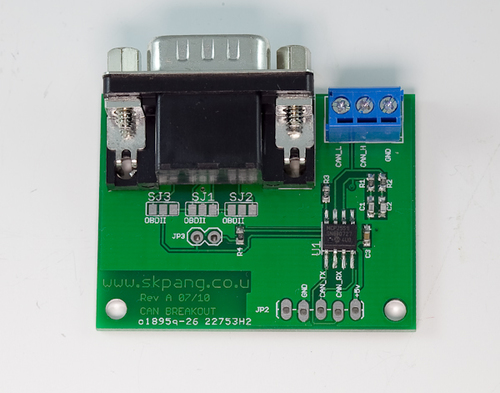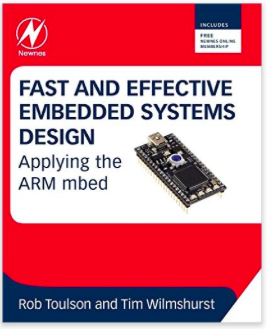Recent Posts
App Note: mbed LPC1768 Development Kit With CAN Bus Breakout Board
Posted by on
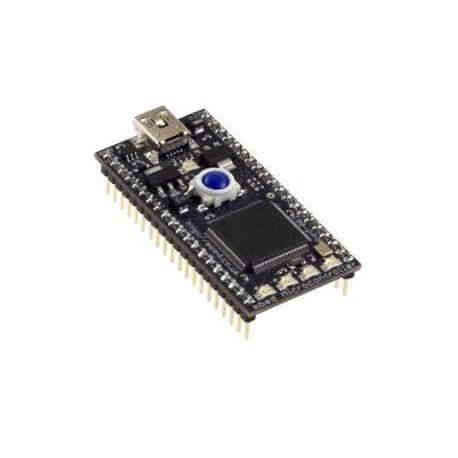
The mbed Microcontrollers are a series of ARM microcontroller development boards designed for rapid prototyping. The mbed NXP LPC1768 Microcontroller in particular is designed for prototyping all sorts of devices, especially those including Ethernet, USB, and the flexibility of lots of peripheral interfaces and FLASH memory. It is packaged as a small DIP form-factor for prototyping with through-hole PCBs, stripboard and breadboard, and includes a built-in USB FLASH programmer.
It is based on the NXP LPC1768, with a 32-bit ARM Cortex-M3 core running at 96MHz. It includes 512KB FLASH, 32KB RAM and lots of interfaces including built-in Ethernet, USB Host and Device, CAN, SPI, I2C, ADC, DAC, PWM and other I/O interfaces. The pinout above shows the commonly used interfaces and their locations. Note that all the numbered pins (p5-p30) can also be used as DigitalIn and DigitalOut interfaces.
The mbed Microcontrollers provide experienced embedded developers a powerful and productive platform for building proof-of-concepts. For developers new to 32-bit microcontrollers, mbed provides an accessible prototyping solution to get projects built with the backing of libraries, resources and support shared in the mbed community.
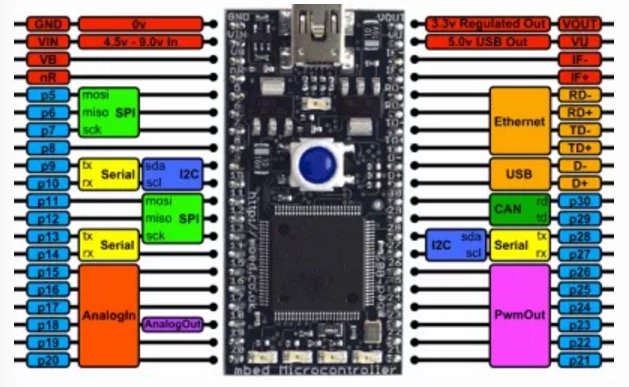
Features:
- NXP LPC1768 MCU
- High performance ARM® Cortex™-M3 Core
- 96MHz, 32KB RAM, 512KB FLASH
- Ethernet, USB Host/Device, 2xSPI, 2xI2C, 3xUART, CAN, 6xPWM, 6xADC, GPIO
- Prototyping form-factor
- 40-pin 0.1" pitch DIP package, 54x26mm
- 5V USB or 4.5-9V supply
- Built-in USB drag 'n' drop FLASH programmer
- mbed.org Developer Website
- Lightweight Online Compiler
- High level C/C++ SDK
- Cookbook of published libraries and projects
Schematics and Data Sheets
mbed NXP LPC1768 Microcontroller
NXP LPC176x MCU
The CAN-Bus breakout board is the perfect solution to adding a full Controller Area Network (CAN) Bus interface to embedded systems such as the Arduino Due or mbed LPC 1768. The board uses Microchip's MCP2551 High Speed CAN Transceiver IC. The output pins are on both screw terminal and DB9 connector. The DB9 can be configure for use with a OBD-II cable or standard CAN pin-out via solder bridges.
More Information on the CAN Bus breakout board...
The following table describes the connection between the mbed LPC 1768 and the CAN bus breakout board. Basically, the Rx on either side must be connected to the Tx line on the other. Last, but not least, both boards will require a 5 VDC power supply.
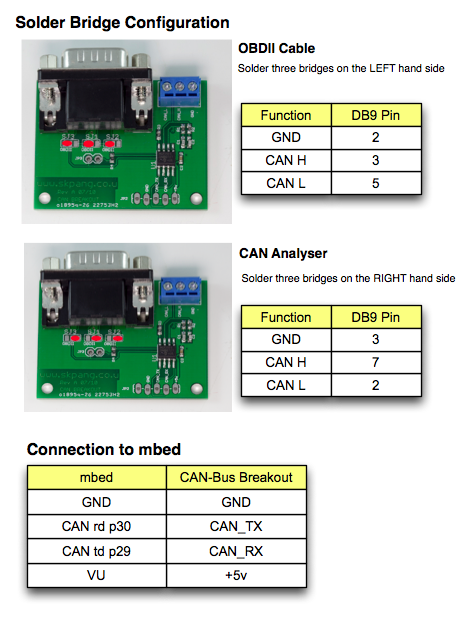
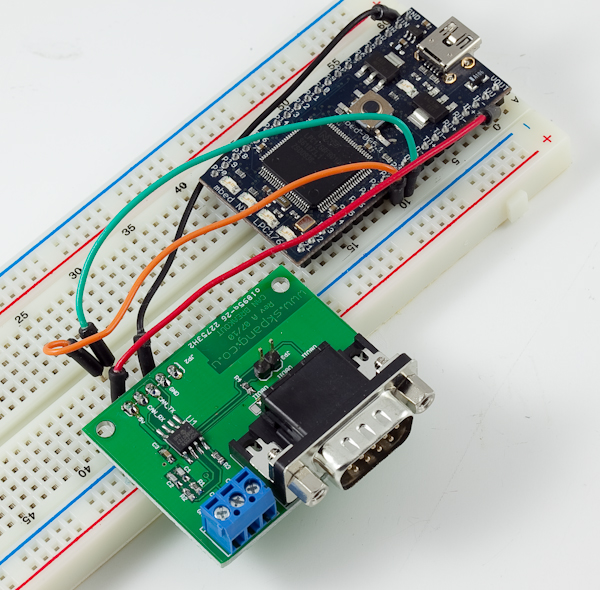
Please be aware that you will need two 120 Ohm terminating resistors at either end of the bus. Without both the transceivers and the terminating resistors, the bus will not work properly.
For CAN Bus programming with the mbed LPC1768 board, please refer to the following link:
Fast and Effective Embedded Systems Design: Applying the ARM mbed
Fast and Effective Embedded Systems Design is a fast-moving introduction to embedded system design, applying the innovative ARM mbed and its web-based development environment. Each chapter introduces a major topic in embedded systems, and proceeds as a series of practical experiments, adopting a "learning through doing" strategy. Minimal background knowledge is needed. C/C++ programming is applied, with a step-by-step approach which allows the novice to get coding quickly. Once the basics are covered, the book progresses to some "hot" embedded issues - intelligent instrumentation, networked systems, closed loop control, and digital signal processing.
Written by two experts in the field, this book reflects on the experimental results, develops and matches theory to practice, evaluates the strengths and weaknesses of the technology or technique introduced, and considers applications and the wider context. Numerous exercises and end of chapter questions are included.
- A hands-on introduction to the field of embedded systems, with a focus on fast prototyping
- Key embedded system concepts covered through simple and effective experimentation
- Amazing breadth of coverage, from simple digital i/o, to advanced networking and control
- Applies the most accessible tools available in the embedded world
- Supported by mbed and book web sites, containing FAQs and all code examples
- Deep insights into ARM technology, and aspects of microcontroller architecture
- Instructor support available, including power point slides, and solutions to questions and exercises
 Loading... Please wait...
Loading... Please wait...

